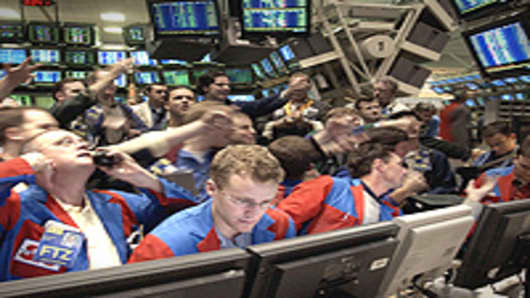Global stock markets are regularly seeing three-percent swings as investors grapple with worries about the euro zone debt situation and escalating tensions between North and South Korea.
Volatility over the past several weeks has pushed the Chicago Board of Options Exchange Volatility Index – the VIX or "fear index" -- back up to levels not seen since the Sept. 11 terrorist attacks.
But betting on pure volatility to fall may now be worthwhile, according to industry experts.
The VIX has been as high as 89 percent and as low as 9 percent, but the long-term historical average hovers at about 20.
The index can’t go below zero, but there is no upper threshold and according to Randy Frederick, director of derivatives trading at Charles Schwab. “There’s always a tendency to migrate back to its long-term average," Frederick said.
With investors panicky about the euro, the “flash crash” and financial reforms, some experts think the VIX is set to cool down.
“Put options are a bit more expensive than call options at the moment – a sign that investors think the likelihood of it going down is better than chances of going up,” Fredrick said.
No Reason to Panic
The VIX is a measure of the implied volatility of S&P 500 index options. But the index is more than a rough gauge of investors’ collective sentiment. It's also more of a measurement of the perception of risk.
“The VIX is an assumption of risk on risk, a derivative on a derivative," Tim Freeman, head of equity derivatives sales at Capstone Global Markets, said.
"It is much more sophisticated than what people normally assume. They’re placing their bets on the movement of VIX, not the volatility of the S&P.”
The VIX has increased 157 percent since April 12. “The likelihood that we’ll see VIX return to low 20s in the near future is low," Scott Fullman, director of derivatives strategy at WJB Capital, said. "I think we could go down to low 30s, creating a new, higher normalized range.”
How can investors profit, or at least protect their portfolios from large market swings using the VIX?
“I’m suggesting bear spreads. Remain defensive," Freeman said. "Bull spreads as an alternative to going long a stock and selling out-of-the-money calls and puts to take advantage of higher premiums.” he said.
A bull spread is an option strategy that is designed to pay off if the price of the stock increases moderately, and can be constructed using two call options.
The price of an option is affected by volatility and a number of factors, including the price of the underlying security, the interest rate and time to expiration. When market volatility increases, options become more expensive.
But other experts emphasized that the VIX may not be an ideal product for retail investors.
“Most retail investors don’t understand the difference between VIX daily quote and VIX futures,” Frederick said. “You’d have to have an extremely short-term perspective – that of an intraday trader, a few minutes to an hour.”
“When you own volatility, you have a wasting asset," Steve Sosnick, equity risk manager at Interactive Brokers, said. "If you buy volatility and the market doesn’t move very much, you lose the time premium. Professionals tend to not mind selling volatility because the decay works for you. On the other hand, it’s a riskier trade.”
Fear of the Unknown
The VIX has the ability to be a protective device, but it is not the best indicator of the market by any means, strategists said.
"What it measures is uncertainty. The degree that investors think they can predict what will happen the next day, or the next hour.” Frederick said.
“The VIX is a volatile number itself. It tends to go down a lot slower than it goes up.” “The historical volatility of the VIX (which is measured over 30 days) is now just about 224 percent – significantly higher than any equities or bonds, which average about 20 – 25 percent," he said.
Historical volatility of the VIX in mid-April, in contrast, was only 52 percent.
The VIX plunged 36 percent -- the biggest drop since its creation -- after European officials unveiled a $960 billion loan plan to end the region’s sovereign-debt crisis and global stocks soared.
“The question remains – is it enough?” Fullman said, referring to the bailouts.
Furthermore, limits on trades to credit default swaps – such as Germany’s ban on short selling those products-- are detrimental to market confidence, according to Fullman.
Ultimately, investors will need some indications on the success of government rescue packages like the European Central Bank's recent trillion-dollar package before volatility subsides.
But while these bailouts were meant to have attempted to a stabilizing effect, some are wondering if they’re doing just the opposite.
“The VIX is likely to be elevated for a while, spiking whenever some piece of news comes out about Germany, Greece, etc,” Frederick said.
“If you think there are too many unresolved items on the horizon – not limited to Greece, the euro, the other Mediterranean countries, the risk of a double dip in the US – then shorting the VIX could be a very risky proposition,” Sosnick said.
He added, “I don’t like to say 45 is very fearful, or 20 is not, but the VIX does tend to reflect investor nervousness."


